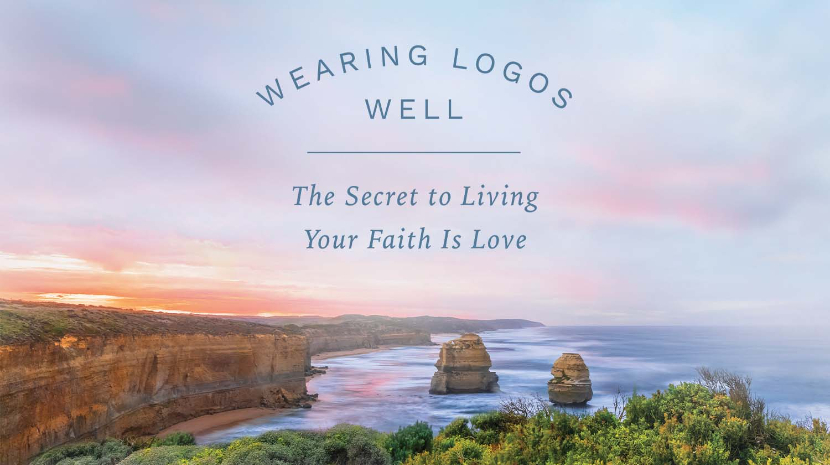From the September 2023 Issue

Wearing Logos Well
The Secret to Living Your Faith Is Love
When color television came onto the scene in the 1950s, John Graham, director of design at NBC, thought of the colorful feathers of a peacock. He created a logo based on that, and in the early days the feathers would fan out as an announcer boasted, “The following program is brought to you in living color on NBC.” Though the NBC peacock has undergone renovations over time, it still remains one of the most easily identifiable logos in advertising history. If you’ve ever owned a television set, you’ve seen the NBC peacock.
Of course, logos are everywhere. Some of the most famous? The McDonald’s arches, the multicolored G for Google, the purple and orange FedEx symbol we see on the sides of delivery trucks, the colored rings for the Olympics, and, of course, the mysterious siren on the green Starbucks emblem.
Logos
Jesus Himself is the Word—the Logos.
But where did the word logo come from to begin with? Would you believe it has biblical roots? Our English term logo comes from an important Greek word found in the New Testament—logos, which is typically translated “word.” This is the term John used when he wrote, “In the beginning was the Word [Logos], and the Word [Logos] was with God, and the Word [Logos] was God” (John 1:1).
Jesus Himself is the Word—the Logos. When we follow Him, we are marked with His love. It’s like a logo stamped onto us. When we live as Jesus did, that distinctive sign marks us as belonging to Him. It shows up at every point in our lives, our attitudes, and especially our behavior.
Agape
And it’s not just any old love. It’s New Testament agape love.
The Bible says, “Though I speak with the tongues of men and of angels, but have not love, I have become sounding brass or a clanging cymbal. And though I have the gift of prophecy, and understand all mysteries and all knowledge, and though I have all faith, so that I could remove mountains, but have not love, I am nothing. And though I bestow all my goods to feed the poor, and though I give my body to be burned, but have not love, it profits me nothing” (1 Corinthians 13:1-3).
The most important thing about us is not what we think, say, or do—it is how we love.
At the heart of this agape love is the concept of sacrifice. Agape love has been defined in various ways, but one of the greatest definitions I have found is this: Agape love is the power that moves us to respond to someone’s needs with no expectation of reward.
Now think of that in terms of how you relate to your husband, your wife, your parents, your children, your boss, your employees, your friends at church. Agape love is the power that moves us to respond to someone’s needs without any expectation at all that we will receive something back in return.
If you were to take agape as your logo, how would your daily attitude and behavior change?
The most important thing about us is not what we think, say, or do—it is how we love. Love is the preeminent grace. It’s as if God were saying to us, “If you could have any one quality in your life, let Me tell you which one to choose. Choose love, for that is the preeminent grace. That will help you to be what I want you to be.”
Outheis
It’d be wonderful to have a powerful way of communicating—to have a voice with the authority of Billy Graham, the eloquence of Charles Spurgeon, the wisdom of a diplomat, the tone of the richest keys of a piano. And wouldn’t you like to have the ability to understand everything in the Bible and to speak the truths of Scripture without a hint of error? How about being a mighty man or woman of faith, who can trust God in the face of any adversity and maintain poise and courage? How would you like to be known for your works of charity or for your willingness to embrace persecution for the sake of Christ?
According to 1 Corinthians 13, all of these would be meaningless unless behind them all was the driving force of the love of God. That brings up a third Greek word I want to mention—outheis. It means “nothing.” That’s what we amount to without agape. The apostle Paul told us we can speak with the eloquence of angels, understand all mysteries, have a faith that can move mountains, give all our goods to feed the poor, and give our bodies to the flames. But without love, it profits outheis—nothing!
When we have the true love of God stamped on our heart, however, even the slightest act of kindness, the smallest word of wisdom, the lowest token of faith, and the smallest offering of ourselves to the Lord is huge—with powerful results and God-pleasing effects.
This means we must love our spouse as Christ loves the Church. We must love our children as our Heavenly Father loves us. We must love our neighbors as we love ourselves. We must even love our enemies, for they badly need the touch of Christ’s love through us.
Paul said, “This love of which I speak is slow to lose patience—it looks for a way of being constructive. It is not possessive: it is neither anxious to impress nor does it cherish inflated ideas of its own importance. Love has good manners and does not pursue selfish advantage. It is not touchy. It does not keep account of evil or gloat over the wickedness of other people. On the contrary, it is glad with all good men when truth prevails. Love knows no limit to its endurance, no end to its trust, no fading of its hope; it can outlast anything. It is, in fact, the one thing that still stands when all else has fallen” (1 Corinthians 13:4-8, PHILLIPS).
If you were to take agape as your logo, how would your daily attitude and behavior change?
In his book, Smart Compassion, Wesley Furlong wrote, “Several years ago, I read 1 Corinthians 13 and felt myself slipping back into old patterns that were not so loving. I took the next twenty-one days and read this chapter each morning. Each morning I prayed, ‘God, help me to receive and extend your love today, no matter what happens.’ At the end of each day, I took out 1 Corinthians 13 and prayed it again, first in self-examination: ‘God where did your love manifest today through my actions and speech? Where did it not?’ Then, I simply meditated on it. Reading 1 Corinthians 13 each day for twenty-one days was like praying a three-week-long, soaking prayer: ‘God, empower me to love as you love, because right now it's not happening.’ Not surprisingly, during that, God gave me ample opportunities for growth. More than a good cognitive exercise, this twenty-one day experiment was a spiritual practice leading me toward love.”1
What an amazing and unique brand to wear everywhere you go!
The NBC announcer used to say, “The following program is brought to you in living color.” The Lord wants to say about all of us, “These people, known by their love, are brought to you by the King of kings.” That’s a more enduring—and colorful—identity.
“And now these three remain: faith, hope, and love. But the greatest of these is love” (1 Corinthians 13:13, NIV).
Love is the final measure of our faith. It’s the closest we can come to the heart of God. It’s the best way we can communicate the Logos—the Lord Jesus Christ—to the world around us. That’s the greatest trademark secret of all. We are known by our love!
Sources:
1Wesley Furlong, Smart Compassion (Harrisonburg, VA, Herald Press, 2017), 61-62.
More Articles
This Month's Magazine Resource
Subscribe Now
Each month, read articles and devotionals from Dr. David Jeremiah that will encourage, challenge, and strengthen your walk with the Lord.















 Turning Point for God is a tax-exempt, not-for-profit, religious corporation as defined under Section 501(c)(3) of the Internal Revenue Code. Your donation gift(s) are very much appreciated and may qualify as a charitable deduction for federal income tax purposes.
Turning Point for God is a tax-exempt, not-for-profit, religious corporation as defined under Section 501(c)(3) of the Internal Revenue Code. Your donation gift(s) are very much appreciated and may qualify as a charitable deduction for federal income tax purposes.




